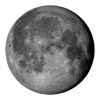Andromeda (The Chained Maiden) Constellation
Andromeda (pronounced ænˈdrɒmɪdə) is the Latin name of a large constellation (in fact it extends itself for about 45 degrees across the sky) situated north of the celestial equator. As such, it is more easily visible from the northern hemisphere.
In English language this constellation is also known as "The Chained maiden" while in astronomical texts and literature this constellation is often abbreviated as "And" (according to the standard of the International Astronomical Union - IAU) or as "Andr" (according to a naming convention used by NASA).
The Latin genitive of the constellation name is "Andromedae" (pronounced ænˈdrɒmɪdiː) and it is used to identify some of the brightest stars in this constellation based on the Bayer or Flamsteed star naming convention. For instance: α Andromedae (the brightest star of Andromeda based on the Bayer catalog); or 23 Andromedae (the 23th star in the constellation of Andromeda based on the Flamsteed catalog).
Sky Chart of Andromeda Constellation
Here we provide a simplified sky chart of the Andromeda constellation. Alternatively it is possible to locate Andromeda in the night sky using our Online Interactive Planetarium.

Visibility of Andromeda Constellation
Location: Markópoulo Oropoú, Greece
Latitude: 38° 17’ 23” N
Longitude: 23° 49’ 29” E
Timezone: Europe/Athens
Today's Andromeda rise, transit and set times from Markópoulo Oropoú, Greece are the following (all times relative to the local timezone Europe/Athens):
The rise and set times provided here are just directional indications and they refer to a point approximately placed at the center of the constellation. In case of very large constellations (like Andromeda actually is) these times can have little relevance.
Bright Stars in Andromeda Constellation
The table below lists the top 20 brightest stars in the Andromeda constellation. See also the complete list of 173 stars brighter than magnitude 6.5 (approximate) in the constellation of Andromeda. Click on each star to see more details about it.
| HR Number(*) | Star designation | Proper name | Visual magnitude | Color | Notes | |
|---|---|---|---|---|---|---|

|
HR15 | α Andromedae | Alpheratz | 2.06 | ⬤ | Variable; Double; |

|
HR337 | β Andromedae | Mirach | 2.06 | ⬤ | Variable; Multiple; |

|
HR603 | γ1 Andromedae | Almach | 2.26 | ⬤ | Multiple; |

|
HR165 | δ Andromedae | 3.27 | ⬤ | Multiple; | |

|
HR464 | 51 Andromedae | Nembus | 3.57 | ⬤ | |

|
HR8762 | ο Andromedae | 3.62 | ⬤ | Variable; Multiple; | |

|
HR8961 | λ Andromedae | 3.82 | ⬤ | Variable; Multiple; | |

|
HR269 | μ Andromedae | 3.87 | ⬤ | Multiple; | |

|
HR215 | ζ Andromedae | 4.06 | ⬤ | Variable; Multiple; | |

|
HR458 | υ Andromedae | Titawin | 4.09 | ⬤ | Multiple; |

|
HR8976 | κ Andromedae | 4.14 | ⬤ | Multiple; | |

|
HR335 | φ Andromedae | 4.25 | ⬤ | Variable; Double; | |

|
HR8965 | ι Andromedae | 4.29 | ⬤ | Variable; | |

|
HR154 | π Andromedae | 4.36 | ⬤ | Variable; Multiple; | |

|
HR163 | ε Andromedae | 4.37 | ⬤ | ||

|
HR271 | η Andromedae | 4.42 | ⬤ | Double; | |

|
HR8830 | 7 Andromedae | 4.52 | ⬤ | ||

|
HR68 | σ Andromedae | 4.52 | ⬤ | Variable; | |

|
HR226 | ν Andromedae | 4.53 | ⬤ | ||

|
HR63 | θ Andromedae | 4.61 | ⬤ | Variable; | |
| ...go to the complete list of 173 bright stars in the constellation of Andromeda | ||||||
(*) HR stands for Harvard Revised Bright Star Catalogue, which is also known as the Yale Catalogue of Bright Stars.
Deep Sky Objects in Andromeda Constellation
The table below lists the 20 brightest deep sky objects in the Andromeda constellation. See also the complete list of 198 deep sky objects in the constellation of Andromeda. The list includes objects from the Messier, New General Catalogue (NGC) and Index Catalogue (IC).































